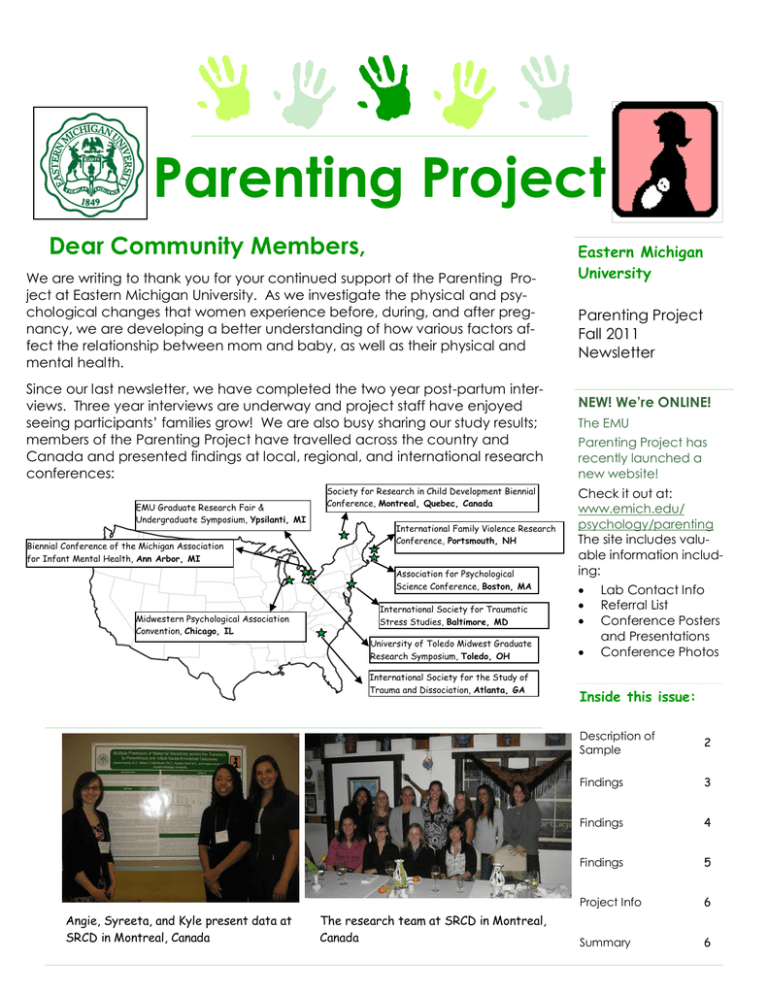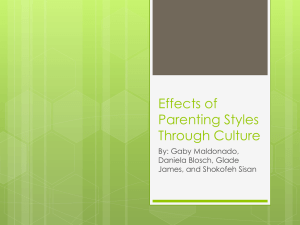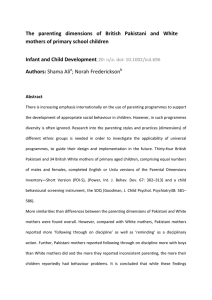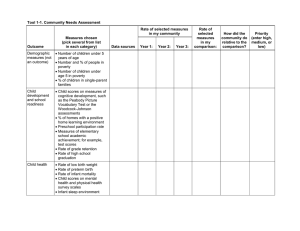Parenting Project Dear Community Members, Eastern Michigan University
advertisement

Parenting Project Dear Community Members, We are writing to thank you for your continued support of the Parenting Project at Eastern Michigan University. As we investigate the physical and psychological changes that women experience before, during, and after pregnancy, we are developing a better understanding of how various factors affect the relationship between mom and baby, as well as their physical and mental health. Since our last newsletter, we have completed the two year post-partum interviews. Three year interviews are underway and project staff have enjoyed seeing participants’ families grow! We are also busy sharing our study results; members of the Parenting Project have travelled across the country and Canada and presented findings at local, regional, and international research conferences: EMU Graduate Research Fair & Undergraduate Symposium, Ypsilanti, MI Biennial Conference of the Michigan Association for Infant Mental Health, Ann Arbor, MI Society for Research in Child Development Biennial Conference, Montreal, Quebec, Canada International Family Violence Research Conference, Portsmouth, NH Association for Psychological Science Conference, Boston, MA Midwestern Psychological Association Convention, Chicago, IL International Society for Traumatic Stress Studies, Baltimore, MD University of Toledo Midwest Graduate Research Symposium, Toledo, OH International Society for the Study of Trauma and Dissociation, Atlanta, GA Angie, Syreeta, and Kyle present data at SRCD in Montreal, Canada The research team at SRCD in Montreal, Canada Eastern Michigan University Parenting Project Fall 2011 Newsletter NEW! We’re ONLINE! The EMU Parenting Project has recently launched a new website! Check it out at: www.emich.edu/ psychology/parenting The site includes valuable information including: Lab Contact Info Referral List Conference Posters and Presentations Conference Photos Inside this issue: Description of Sample 2 Findings 3 Findings 4 Findings 5 Project Info 6 Summary 6 Description of Sample Where Participants Heard about the Study Parenting Class, 2% Word of Mouth, 10% Donation Centers, 5% CommunityBased Health Clinics, 23% Subsidized/ Temporary Housing Facility , 7% Head Start/Daycare Programs, 7% WIC Program, 18% Community Baby Shower, 12% Student Areas at Local Colleges, 16% Participant Characteristics Asian American, 2% Arab American, 2% Other, 1% AfricanAmerican, 47% Biracial, 12% Caucasian, 36% Race At the beginning of the study, Average Age: 26 (range = 18-42) 30% first-time mothers Median monthly income: $1,500 88% received services from WIC 90% had public health insurance A majority of women received food stamps and/or public cash assistance Marital Status: 64% Single, 28% Married, 4% Separated, 4% Divorced Page 2 Parenting Project Maternal Sensitivity We know from other studies that maternal behaviors that are sensitive in nature impact childhood development. Our research looked at what early parenting factors might predict levels of maternal sensitivity. We found that in general, some things predict higher maternal sensitivity. An increased knowledge of infant development, a low level of daily hassles, and low potential for child abuse predict higher levels of sensitive behavior by moms toward their infants. These results suggest that helping mothers increase their knowledge about children and relieving some of their stress can promote more positive parenting, which in turn, promotes infant development. Parental Reflective Functioning Some of our work has been guided by the knowledge that Parental Reflective Functioning will help us understand the interaction between mother and child. Parental Reflective Functioning refers to the ability to reflect on one’s own, as well as one’s child’s, internal thoughts and how these thoughts relate to behavior. Our results suggest that the more a mother can openly consider her child’s thoughts and feelings (mental states) during pregnancy, the more sensitivity she shows toward the infant one year later and the more securely attached the baby is to her. Encouraging parents to think about their child’s thoughts, feelings, and desires may promote more positive parent-child relationships. Trauma at a Young Age Through our study we learned that childhood experiences of trauma are important predictors of adult Post Traumatic Stress Disorder (PTSD) symptoms. While adult trauma is predictive of PTSD symptoms, experiencing child trauma makes the symptoms later in life more difficult. This means that it is very important to understand trauma experiences across life and to work to prevent trauma from occurring in the first place. Child trauma is also not significantly associated with PTSD symptoms for most mothers who are in a secure and satisfying romantic relationship. This suggests that positive romantic relationships benefit the mother-child relationship and the mothers’ own well-being. Parenting Project Page 3 Violence in Mothers’ Relationships We have found that women who experienced childhood maltreatment tend to have more anxiety in adult relationships. However, anxiety is worse for women who experience chronic intimate partner violence in adult romantic relationships. Intimate partner violence comes in more forms than one might think. For example, it is not uncommon for women to have partners who use their children to control them. This is violence of a psychological nature. This type of intimate partner violence results in higher rates of psychological distress in the mother, such as Post Traumatic Stress Disorder (PTSD) symptoms, depression, anxiety, etc. Partner violence of a psychological nature can also impact the mothers’ physical health as well. Violence: Effects on Children Intimate partner violence tend to have children with more socio-emotional problems than children who are not exposed to violence. This is especially true for children of mothers who exhibit certain symptoms of PTSD. In particular, mothers who may appear jumpy or hyper vigilant in front of their child, may have children with more socio-emotional difficulties. These results suggest it is critical to support Our study has shown that violence between mothers mothers who experience violence and to and romantic partners impact the baby as well. We help reduce their distress for her and her have found that mothers who experience more children’s sake. Page 4 Parenting Project Understanding Baby Emotion We have found that certain factors are associated with a mother’s perceptions of her child’s emotions (also known as affect). Mothers that find parenting less stressful are more likely to perceive less anger or less negative emotions in their babies. Also, mothers who experience less postpartum depression are more likely to perceive less negative emotion in their babies. In turn, perceptions of infant emotions influence how moms parent. Also, mothers that had higher levels of maternal sensitivity (see page 3) perceived baby responses in a more positive light. Increasing maternal sensitivity may help increase positive perceptions of affect, and vice-versa. In addition, increased self-esteem about being a mother is associated with more shared positive affect between mother and child while interacting. Perhaps improving mothers’ sense of competency in parenting improves the perception of positive emotion in the child, benefitting both mom Parenting Project Presentations Kate and Angela at EMU Undergraduate research symposium in Ypsilanti, MI Parenting Project Fall 2011 Newsletter Katherine receiving her award at the EMU Graduate Research Fair The research team at the EMU Graduate Research fair, in Ypsilanti, MI Page 5 Eastern Michigan University Parenting Project Dr. Alissa Huth-Bocks Depart. of Psychology Ypsilanti, MI 48197 Kyle, Syreeta, Dr. Huth-Bocks, Erin & Sarah at the Michigan Association for Infant Mental Health, Ann Arbor, MI Phone: 734-487-2238 E-mail: ahuthboc@emich.edu Dr. Huth-Bocks, Syreeta, Andrea, & Sarah at SRCD in Montreal, Canada Summary of Findings in 2011 The Parenting Project is making important discoveries concerning the physical and mental health of both mothers and their infants. Thanks to our wonderful recruitment sites and participating families, we are gaining a better understanding of how to improve interventions and public resources to help address the needs of mothers and families in our community. Based on our study results, it will continue to be important to focus services on assessing and improving maternal mental health, ensure that community resources are both available and accessible, and continue to educate mothers about healthy parenting practices. As our findings demonstrate, parenting skills are very important to infants’ social and emotional health. There is a need to implement clinical interventions during and after pregnancy for at-risk mothers to support the mother-infant relationship. As we continue to learn about healthy parenting and family relationships, we are excited to pass this knowledge on to the community. “We are gaining a better understanding of how to improve interventions and public resources to help address the needs of mothers and families in our community.” Looking Ahead... The Parenting Project is almost done collecting data for the study! We are currently finishing the interviews when children are 3 years old. We are looking forward to learning as much as we can from the study results, and will keep the community notified of important findings. We greatly appreciate all of our participating mothers and children! Parenting Project Fall 2011 Newsletter Page 6


